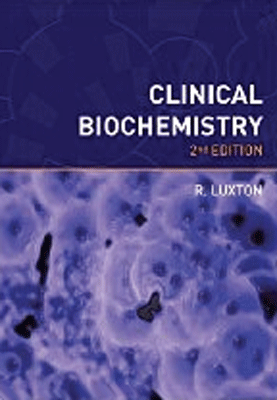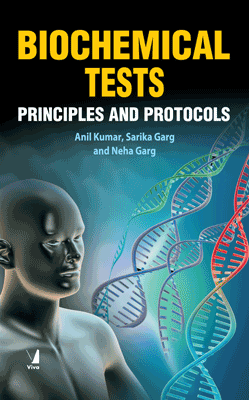Clinical Biochemistry, 2/e
Clinical Biochemistry, 2/e
₹895.50 ₹995.00 Save: ₹99.50 (10%)
Go to cartISBN: 9788130906010
Bind: Paperback
Year: 2020
Pages: 272
Size: 178 x 242 mm
Publisher: Scion Publishing Limited
Published in India by: Viva Books
Exclusive Distributors: Viva Books
Sales Territory: India, Nepal, Pakistan, Bangladesh, Sri Lanka
Description:
Clinical Biochemistry, 2nd edn focuses on the areas of body function required for the maintenance of health:
- input — nutrition and digestion
- control — genetic and chemical control of metabolism and water and electrolyte balance processing — enzymes in health and disease
- transport and storage — plasma proteins, lipids, and blood gases
- defence — immunogloublins and the proteins of the innate immune system
- output — liver and kidney function
Each chapter provides an introduction to pathophysiology —how biochemical changes arise as a result of disease processes. The book also describes the important methods used in clinical biochemistry laboratories to show how biochemical changes are measured and how they change during disease.
The new edition has been substantially revised to incorporate the latest developments in genomics, proteomics, and biosensors.
This book is essential reading for all students studying clinical biochemistry, especially those on biomedical science courses.
Target Audience:
Students of Clinical Biochemistry and Biomedical Science.
Contents:
Clinical biochemistry • What is clinical biochemistry? • The role of the clinical biochemistry laboratory • What does the result mean? • Reference ranges • Clinical utility • Blood samples • Units of measurement • Suggested further reading • Self-assessment questions • Input • Nutrition and drugs • Composition of the body • Macronutrients • Micronutrients • Minerals and trace elements • Assessment of nutritional status • Toxicology • Laboratory measurement of nutrients and drugs • Spectroscopy and colorimetry • Suggested further reading • Self-assessment questions • Digestion • The food we eat • The digestive process • Gut hormones • Clinical disorders • Investigation of malabsorption • Suggested further reading • Self-assessment questions • Control • Genetic control • DNA and genetic information • Proteins from DNA • Genetic damage • Cancer and tumour markers • Genetic disease and the clinical biochemistry laboratory • Suggested further reading • Self-assessment questions • Endocrinology — chemical control • Transport of hormones • Action of hormones • Control of hormone production • The hypothalamic—pituitary axis • Endocrine disorders • Investigation of endocrine disease • Measurement of hormones • Suggested further reading • Self-assessment questions • Thyroid hormones • The thyroid gland • Thyroid hormones • Action of thyroid hormones • Thyroid hormone homeostasis • Thyroid disease • Measurement of thyroid hormones • Suggested further reading • Self-assessment questions • Control of water and electrolyte metabolism • Water balance • The importance of sodium • Control of osmolality • Disorders of water and electrolyte balance • Potassium • Disorders of potassium metabolism • Measurement of sodium and potassium • Suggested further reading • Self-assessment questions • Control of calcium metabolism • Calcium • Calcium control • Phosphate • Disorders of calcium metabolism • Measurement of calcium • Suggested further reading • Self-assessment questions • Control of carbohydrate metabolism • Glucose homeostasis • Insulin • Disorders of carbohydrate metabolism • The investigation of glucose disorders • Suggested further reading • Self-assessment questions • Processing • Enzymes • Isoenzymes and isoforms • Clinically important enzymes • Enzymes and tissue damage • Principles of enzyme measurements • Biosensors • Suggested further reading • Self-assessment questions • Inborn errors of metabolism • Inheritance • Investigation of IBEM • Prenatal diagnosis • Phenylketonuria • Cystic fibrosis • Chromatography • Suggested further reading • Self-assessment questions • Transport and storage • Plasma proteins • Total protein • Protein groups • Specific proteins • Measurement of plasma proteins • Suggested further reading • Self-assessment questions • Lipids and lipoproteins • Lipids and lipoproteins • Lipid transport • Lipid disorders • Atherosclerosis • Laboratory investigations of lipid • Suggested further reading • Self-assessment questions • Acid—base balance and blood gases • Control of pH • Normal pH • Disorders of acid—base balance • Pathophysiology • Anion gap • Blood gases • Blood gas measurements • Suggested further reading • Self-assessment questions • Defence • Immunoglobulins • Antibodies • Disorders associated with antibodies • Laboratory investigation of antibodies • Laboratory techniques in the investigation of antibodies • Suggested further reading • Self-assessment questions • Proteins of the innate immune system • Complement proteins • Acute-phase proteins • Interferons • Clinical biochemistry and the innate immune system • Suggested further reading • Self-assessment questions • Output • Kidney function • Kidney structure and function • Kidney disease • Glomerular function • Tubular function • Proteinuria • Renal stones • Suggested further reading • Self-assessment questions • Liver function • Liver structure • Bilirubin metabolism • Jaundice • Liver disease • Investigation of liver disease • Suggested further reading • Self-assessment questions • Answers to self-assessment questions • Index
About the Author:
R. Luxton is a Senior Lecturer in Clinical Chemistry, Department of Biological and Biomedical Science, University of the West of England, Bristol, UK.




